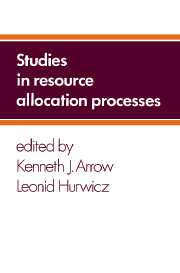Book contents
- Frontmatter
- Contents
- Preface
- Acknowledgments for reprinted articles
- PART I General introduction
- PART II Economies with a single maximand
- PART III Economies with multiple objectives
- PART IV General characterizations of allocation processes
- Appendix: An optimality criterion for decision-making under ignorance
- Author index
- Subject index
- Index of examples
Appendix: An optimality criterion for decision-making under ignorance
Published online by Cambridge University Press: 04 April 2011
- Frontmatter
- Contents
- Preface
- Acknowledgments for reprinted articles
- PART I General introduction
- PART II Economies with a single maximand
- PART III Economies with multiple objectives
- PART IV General characterizations of allocation processes
- Appendix: An optimality criterion for decision-making under ignorance
- Author index
- Subject index
- Index of examples
Summary
Introduction
It is intended here to offer a possible characterization of the concept of complete ignorance. Like other formulations, the problem is taken to be that of choice of an action from a given set when the consequences of any action are functions of an unknown state of nature. However, the properties regarded as defining an optimal choice are designed to reflect completely the idea that there is no a priori information available which gives any state of nature a distinguished position. Most importantly, the optimality criterion differs from those in the now more standard subjective probability framework by not presupposing a fixed list of states of nature. As we note shortly, the arguments and conclusions are much closer to Shackle's than to those of Ramsey, de Finetti, and Savage.
The axiom systems of these last authors imply the existence of subjective probabilities as weights to be assigned to the different possible states of nature. These authors thus provide a foundation for the centuries-old use of probability as a guide to action. The concept of complete ignorance can be expressed in this subjective probability framework only by the assignment of equal probabilities to all the states of nature, which is the principle of indifference or insufficient reason implicit in the earliest combinatorial probability calculations of Pascal and Fermat and explicit in Jacob Bernoulli, Bayes, and Laplace.
- Type
- Chapter
- Information
- Studies in Resource Allocation Processes , pp. 461 - 472Publisher: Cambridge University PressPrint publication year: 1977
- 27
- Cited by

